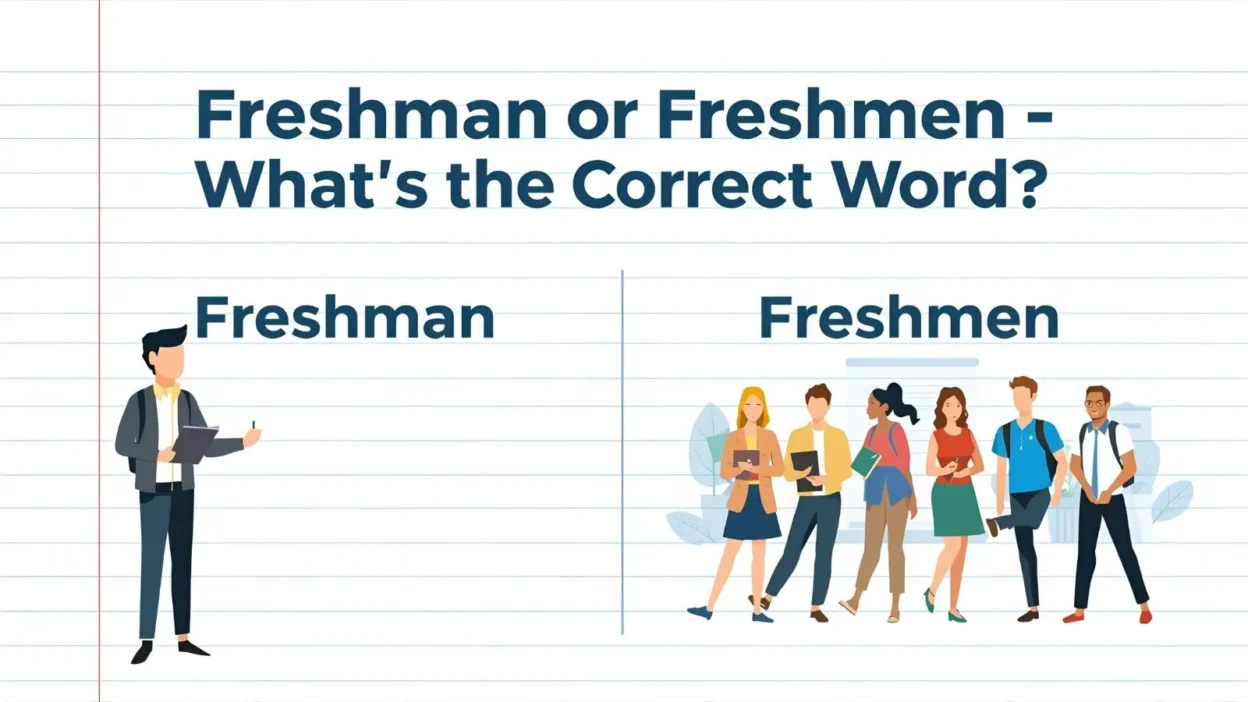Ever paused mid-sentence wondering, “Is it freshman or freshmen?” 🤔 You’re not alone — thousands struggle with this tiny yet tricky grammar detail.
If you’re a student, writer, or English learner, this guide is written just for you. I’ll talk to you directly and clear up the confusion once and for all.
By the end, you’ll know exactly when to use each word — no more hesitation, no more second-guessing.
Let’s fix this grammar mix-up together, right here, right now. 💬
🎓 Freshman or Freshmen – Quick Answer
The word “freshman” refers to one student in the first year of school or college.
The word “freshmen” refers to more than one student — it’s the plural form.
✅ Examples:
- I am a freshman at Harvard University. (singular)
- The freshmen attended the orientation program together. (plural)
👉 Quick Tip: “Freshman” = 1 person. “Freshmen” = many people.
📜 The Origin of Freshman or Freshmen
The word freshman dates back to the 16th century in English universities. It combined “fresh” (new) + “man” (person). It originally meant a newcomer or beginner.
Over time, freshman became the standard word for first-year students, especially in American schools and colleges. Naturally, the plural became freshmen, following the usual English pattern of changing “man” → “men.”
So, just like man → men and woman → women, the same rule applies:
➡️ freshman → freshmen.
British English vs American English Spelling
Both British and American English use freshman and freshmen, but they apply them differently.
In American English, freshman is very common for first-year students in high schools and universities.
In British English, the word is less common; people usually say first-year student or first-year undergraduate.
| Usage Area | Preferred Term | Example Sentence |
|---|---|---|
| 🇺🇸 United States | Freshman / Freshmen | Freshmen must register for courses online. |
| 🇬🇧 United Kingdom | First-year student | I’m a first-year at Oxford. |
| 🇨🇦 Canada | Freshman / First-year | Freshman students attend orientation week. |
| 🇦🇺 Australia | First-year | Our first-years are settling in well. |
🎯 In short: Freshman and freshmen are mostly American English terms. 🇺🇸
🧠 Which Spelling Should You Use?
Use freshman when you’re referring to one student, and freshmen when referring to many students.
However, your choice can also depend on where your audience lives:
- Writing for American readers? Use freshman/freshmen.
- Writing for UK or Commonwealth readers? Use first-year student(s) instead.
- Writing for a global audience? Use first-year student(s) for clarity and inclusivity.
✨ Example:
Our college welcomes all new first-year students (freshmen) to campus.
⚠️ Common Mistakes with Freshman or Freshmen
Here are some frequent errors and their corrections:
| ❌ Incorrect | ✅ Correct | Explanation |
|---|---|---|
| Many freshman attended the event. | Many freshmen attended the event. | “Freshmen” is plural. |
| She is a freshmen. | She is a freshman. | “Freshman” is singular. |
| Freshmans | Freshmen | “Freshmans” is not a word. |
| The freshman students gathered. | The freshmen gathered. | Avoid redundancy. “Freshmen” already implies students. |
🚫 Always double-check whether your sentence is singular or plural before choosing the word!
🏫 Freshman or Freshmen in Everyday Examples
Here’s how the words appear in different contexts:
📧 In Emails:
- “Welcome, freshmen, to your first semester at university!”
- “As a freshman, you’ll receive your schedule next week.”
📰 In News Articles:
- “The university hosted over 2,000 freshmen this fall.”
- “A freshman senator introduced the bill yesterday.”
💬 On Social Media:
- “Can’t believe I’m officially a freshman! 🎉”
- “Freshmen orientation was awesome today!”
🧾 In Formal Writing:
- “The freshman class demonstrated outstanding leadership potential.”
These examples show how freshman and freshmen fit naturally into both casual and formal writing.
🌍 Freshman or Freshmen – Google Trends & Usage Data
According to Google Trends, the term freshman is more widely searched than freshmen, especially in the United States and Canada.
| Country | Most Searched Term | Popularity (%) |
|---|---|---|
| 🇺🇸 USA | Freshman | 78% |
| 🇨🇦 Canada | Freshman | 65% |
| 🇬🇧 UK | First-year student | 60% |
| 🇦🇺 Australia | First-year student | 70% |
| 🌏 Global Average | Freshman | 55% |
📈 Insight: Most global users search “freshman” to clarify meaning or grammar rules rather than for plural usage.
FAQs:
Q1. Is freshman singular or plural?
Freshman is singular — it refers to one student.
Q2. Can I say “many freshman”?
No. You should say “many freshmen.”
Q3. Is it correct to say “freshman students”?
Technically yes, but it’s redundant. Just say “freshmen.”
Q4. What’s the plural of freshman?
The plural form is freshmen.
Q5. Is “freshmans” ever correct?
No. “Freshmans” is grammatically incorrect.
Q6. What do British schools say instead of freshman?
They say “first-year student” or simply “first-year.”
Q7. Can “freshman” describe someone new to a job or group?
Yes. Example: She’s a freshman reporter at the news agency.
💡 Conclusion
The difference between freshman and freshmen is simple yet essential.
- Freshman = one person.
- Freshmen = more than one person.
Remember: man → men works the same way. This small change can make your writing clear, polished, and professional.
If you’re writing for an international audience, consider using first-year student(s) — it’s gender-neutral and universally understood.
Next time you write, double-check: Are you talking about one student or many? That’s your answer! 🎯



